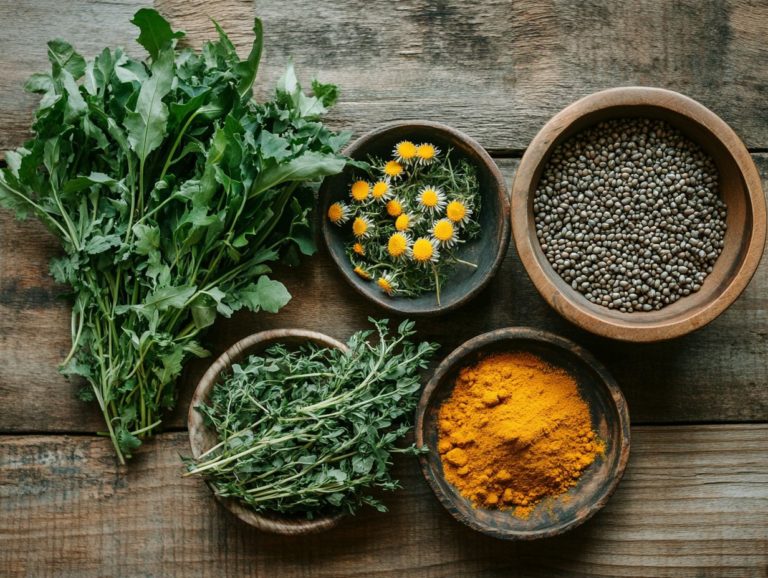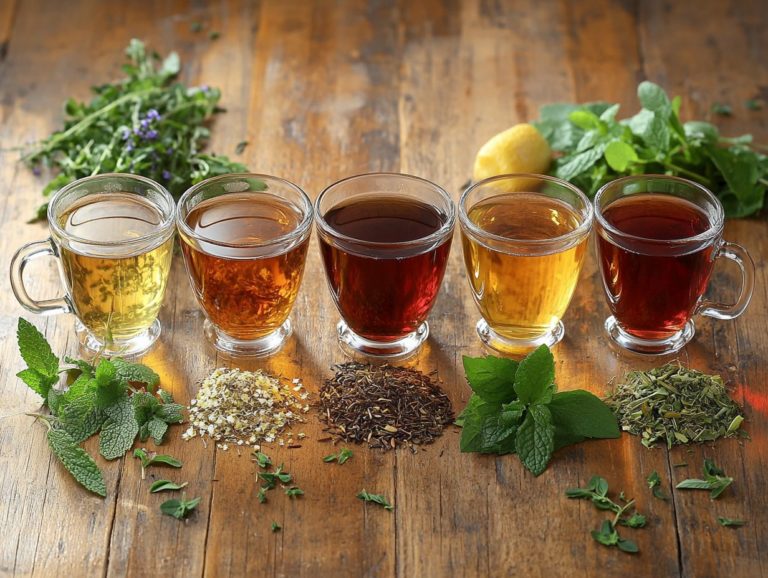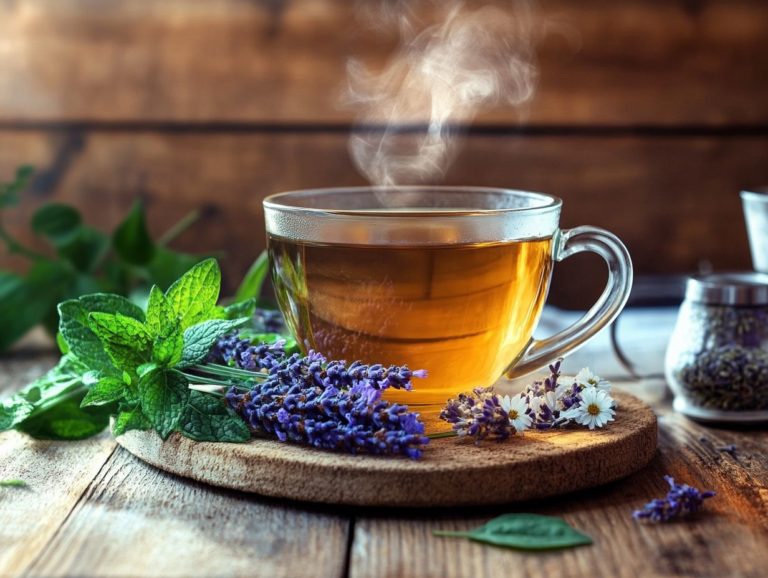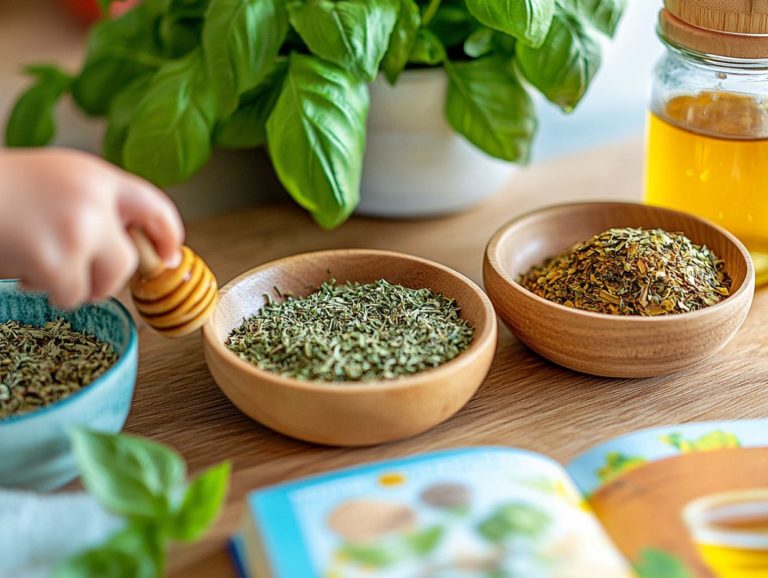The Power of Herbal Remedies: A Beginner’s Guide
Herbal remedies have stood the test of time, providing a natural pathway to healing and wellness. Countless individuals have embraced these solutions for centuries. With the rising interest in holistic health, you may find yourself drawn to plant-based options to enhance your overall well-being.
Join us as we explore the exciting world of herbal remedies, highlighting their many benefits and offering insights on how to select and use them safely.
From understanding the healing properties of popular herbs to learning how to craft your own remedies at home, you ll discover how these natural alternatives can empower your health journey.
Contents
Key Takeaways:
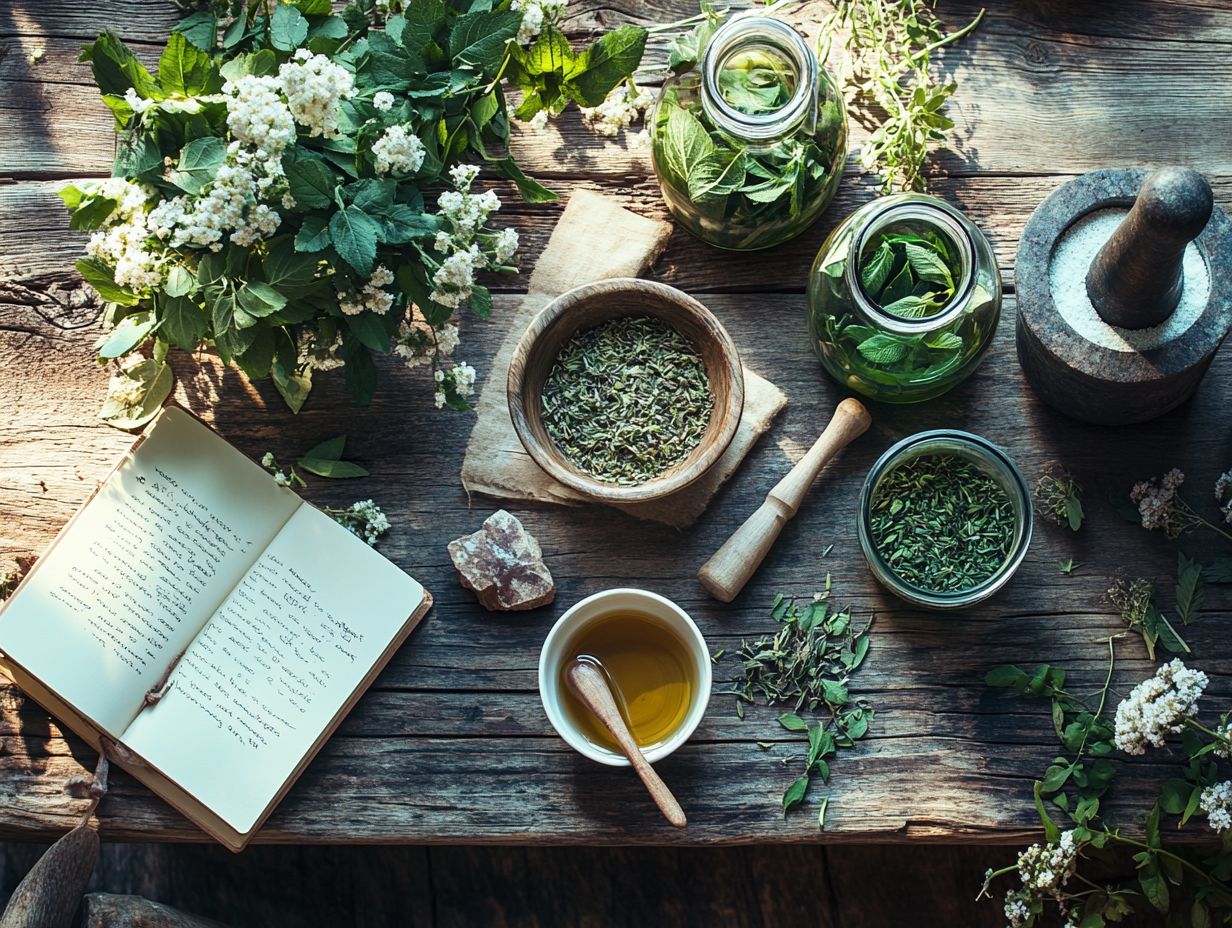
Herbal remedies are natural treatments from medicinal plants, making them a great alternative to traditional medicine. Choosing the right herbal remedy involves considering personal health, potential side effects, and compatibility with other medications. To use herbal remedies safely, it s important to follow proper dosage and administration guidelines. DIY recipes and tips can also help you make your own herbal remedies.
Understanding Herbal Remedies
Understanding herbal remedies is essential for anyone intrigued by natural healing and wellness. These remedies, sourced from medicinal plants, have been employed for centuries across diverse cultures, showcasing the potential of plant medicine in health management.
Whether you are just starting or have some experience with herbal treatments, diving into this field can deepen your appreciation for ancient wisdom and its significance in today s holistic health practices.
What are Herbal Remedies?
Herbal remedies are natural treatments from medicinal plants, offering a range of health benefits that can bolster your immune system and provide emotional support.
These practices have stood the test of thousands of years, deeply ingrained in various cultures worldwide, including Traditional Chinese Medicine and Ayurveda.
By tapping into a diverse array of plants like chamomile for calming effects, ginger for digestive health, and echinacea for an immune boost you’ll find that these remedies often present a gentler alternative to conventional medicine. They align with a vegan lifestyle, emphasizing whole, plant-based ingredients that promote holistic well-being.
Integrating herbal remedies into your daily routine allows you to harness the power of nature for a comprehensive approach to health that nurtures both your body and mind.
Benefits of Herbal Remedies
The benefits of herbal remedies are substantial. You might find yourself among the many who gravitate toward these natural solutions to enhance overall health and wellness.
Renowned for their healing properties, herbal treatments offer various health advantages from boosting your immune system to providing emotional support all while typically presenting a lower risk of side effects compared to conventional medicine.
Natural Healing Properties
The natural healing properties of herbs serve as a cornerstone for both traditional and modern therapeutic practices, enabling you to harness the power of plant medicine for effective wellness solutions.
Understanding these unique chemical properties is important, as they play a significant role in the healing potential of various herbs. For example, the compounds in turmeric that reduce inflammation can assist you in managing chronic pain.
Chamomile contains flavonoids known for their calming effects, making it a favored option for alleviating anxiety and promoting restful sleep.
By diving into the distinct attributes of these therapeutic herbs, you can make informed choices tailored to your specific health needs, ultimately enhancing your overall wellness journey.
Reduced Risk of Side Effects
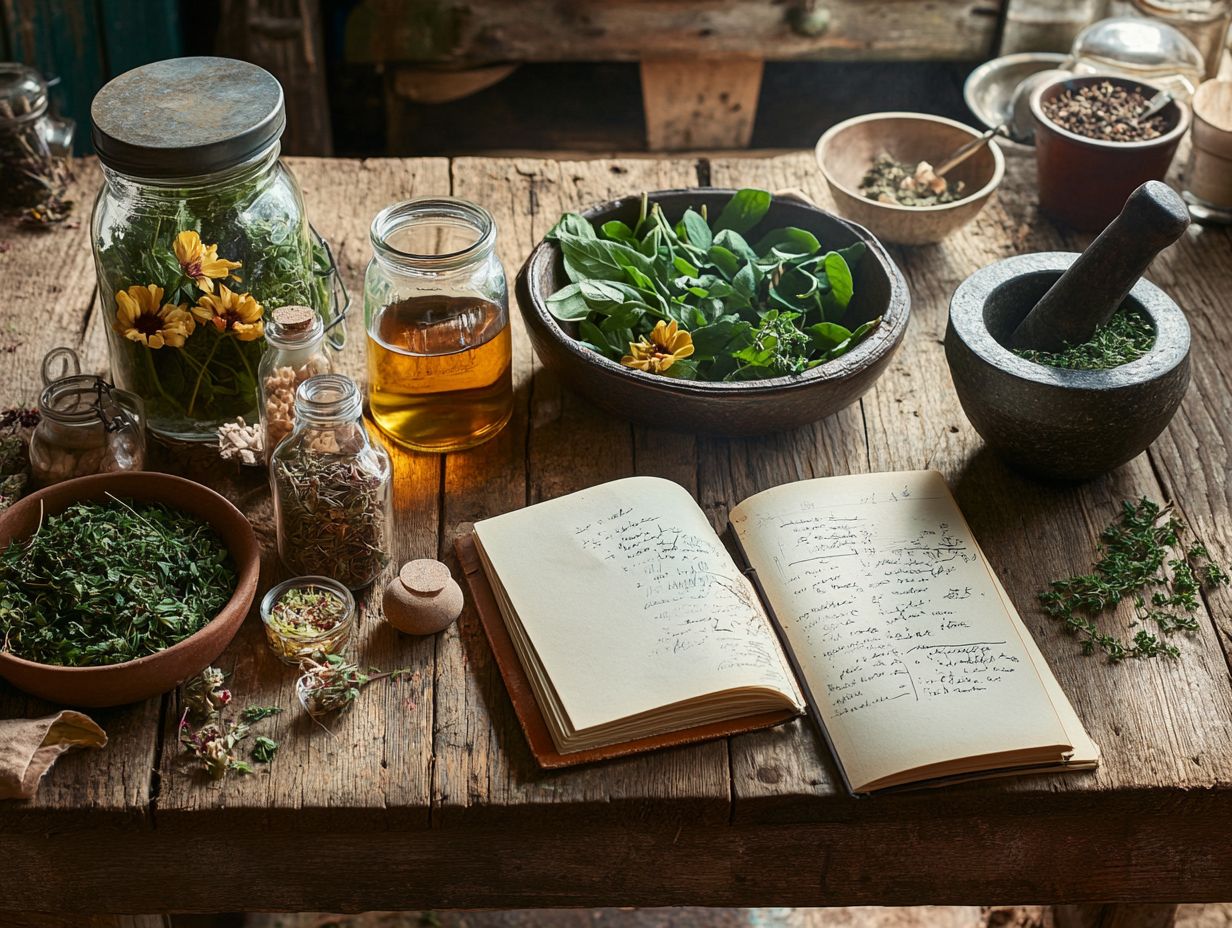
One significant advantage of herbal remedies is their reduced risk of unpleasant side effects compared to conventional pharmaceuticals. This makes them an appealing choice for health-conscious individuals seeking natural alternatives to boost their well-being.
As more people turn to these remedies, the appeal of avoiding uncomfortable reactions becomes increasingly important. Herbs like ginger and chamomile can effectively alleviate digestive issues and anxiety, respectively, often without the drowsiness associated with certain over-the-counter medications.
In contrast, many modern treatments come with extensive lists of potential side effects, prompting you to weigh your options carefully. The benefits of choosing herbs extend beyond just minimal side effects; they promote a holistic approach to health, fostering balance and harmony within your body.
Choosing the Right Herbal Remedy
Choosing the right herbal remedy requires a deep understanding of your unique health needs and the options available. It’s crucial to explore various ingredients and their applications to create a comprehensive herbalist toolkit that promotes effective self-sufficiency.
Factors to Consider
When selecting herbal remedies, consider several key factors to ensure you choose the safest and most effective options. First, assess your individual health conditions, as certain herbs may interact with medications or worsen existing issues.
Knowing the right dosage is key. What works for one person may not work for another. The preparation methods whether you prefer teas, tinctures (extracts made by soaking herbs in alcohol or vinegar), or capsules can also significantly influence the potency and effectiveness of the herbs you choose.
Be aware of potential interactions between different herbs to maximize benefits and minimize risks. By conducting thorough research on the health benefits of various dietary herbs, you empower yourself to make informed choices tailored to your unique circumstances.
How to Use Herbal Remedies Safely
To maximize the benefits of herbal remedies while minimizing potential risks, understanding their safe usage is essential. Proper dosage and administration play a crucial role in their effectiveness and can greatly enhance your health management strategies.
Proper Dosage and Administration
Proper dosage and administration of herbal remedies are paramount for ensuring their effectiveness and safety in your health regimen. Your individual needs may vary significantly based on factors such as age, health condition, and the specific herb.
For example, young children often require a much lower dosage of herbs like chamomile, typically suggested at around 0.5 to 1 ml of the tincture, while adults may benefit from 2 to 4 ml. Elderberries, celebrated for their immune-boosting properties, may also have varying dosage recommendations across different age groups.
Don t hesitate to consult a healthcare professional to ensure you re using the right dosage and enjoying the full benefits of these amazing herbs. Such guidance is essential for the safe and effective use of herbal remedies.
Common Herbal Remedies and Their Uses
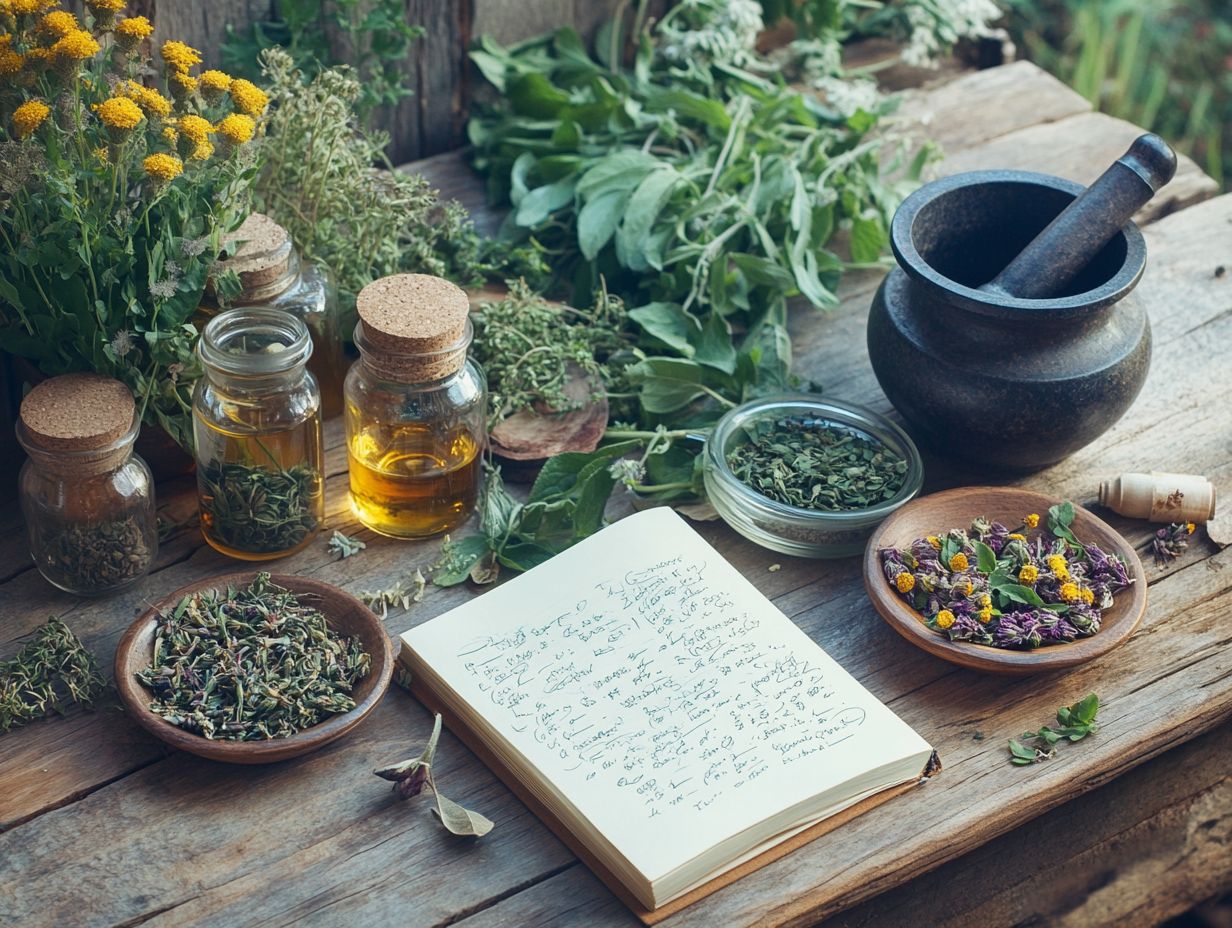
You ll discover that common herbal remedies encompass an impressive array of medicinal herbs, and they each bring unique benefits to the table! For instance, garlic serves as a potent ally in alleviating coughs, while ginger supports digestion with remarkable efficacy.
Then there’s basil, renowned for its impressive anti-inflammatory properties, making it a versatile addition to your wellness toolkit.
Overview of Popular Herbs and Their Benefits
An exploration of popular herbs unveils their varied applications and significant health benefits, making them essential components of any herbalist apothecary or home remedy toolkit.
Among these herbal treasures, basil is particularly noteworthy not just for its aromatic flair in Italian cuisine but also for its impressive anti-inflammatory properties.
Meanwhile, rosemary emerges as a cognitive enhancer, sharpening focus, while thyme boasts natural antiseptic qualities.
Incorporating these herbs into your cooking can truly elevate your meals. Cultivating them in a sunny windowsill or kitchen garden grants you fresh access whenever inspiration strikes.
For those diving into herbal supplements, it’s vital to ensure that the herbs are harvested at their peak potency to maximize their medicinal benefits. When nurtured correctly whether indoors or outdoors these herbs can provide a continuous source of nourishment for both body and palate, beautifully illustrating the deep connection between cooking and holistic health.
Making Your Own Herbal Remedies
Discover the joy of crafting your own herbal solutions! Creating your own herbal remedies is an exciting adventure that gives you the power to tap into the natural potency of plants.
By embracing the philosophy of DIY herbalism, you cultivate a profound sense of self-sufficiency and connection to nature.
Easy DIY Recipes and Helpful Tips
DIY recipes for herbal remedies offer an elegant approach to crafting effective solutions from the comfort of your kitchen, using familiar ingredients and herbs.
Whether you’re looking to soothe a sore throat or create a calming elixir for relaxation, making your own remedies at home is not only rewarding but also cost-effective. You ll discover the power to customize these recipes according to your unique needs, utilizing fresh herbs sourced from local markets or even your own garden.
You can prepare simple infusions or more elaborate liquid herbal extracts, but the true delight lies in the hands-on experience of creating something uniquely yours. Just remember to store your creations in cool, dark places to preserve their potency, ensuring that the benefits of your homemade remedies last over time.
Watch this video to learn more about crafting your own herbal remedies!
Frequently Asked Questions
What are herbal remedies?

Herbal remedies are natural medicinal treatments made from plants, herbs, and other botanical sources. They have been used for centuries to promote healing and overall wellness.
What makes herbal remedies powerful?
Herbal remedies are powerful because they contain a variety of active substances and compounds that work together to provide health benefits. These substances can have anti-inflammatory, antioxidant, and antimicrobial properties.
What are the benefits of using herbal remedies?
Herbal remedies have many benefits, including being natural and often having fewer side effects compared to traditional medicine. They can also promote overall wellness, improve specific health conditions, and be more cost-effective.
Are herbal remedies safe for everyone?
While herbal remedies are generally considered safe, it’s important to consult with a healthcare professional before incorporating them into your treatment plan. Some herbs may interact with medications or have adverse effects on certain health conditions.
How can I incorporate herbal remedies into my daily routine?
One easy way to incorporate herbal remedies into your routine is by brewing herbal teas or adding them to your meals as spices. You can also find herbal supplements, tinctures, and topical products that can be used as needed.
Where can I find reliable information about herbal remedies?
Online resources, books, and consultations with a trained herbalist or healthcare professional can provide reliable information about herbal remedies. It’s important to do your research and choose products from reputable sources to ensure safety and effectiveness.

